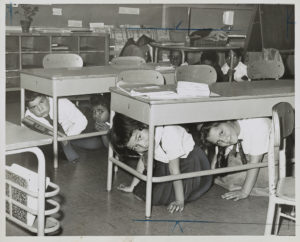By Taylor Felt, Policy Intern
 Prior to the fall semester of my junior year at the University of Southern California (USC), my understanding of nuclear weapons and their role in global politics was a mile wide and an inch deep. Unlike the people who lived through the “duck-and-cover” age, I practiced diving under my desk in case of an earthquake. It was, and frankly still is, unfathomable that students performed the same action in preparation for a nuclear attack. Beyond this assessment, any stray thoughts I had regarding nuclear weapons were few and far between.
Prior to the fall semester of my junior year at the University of Southern California (USC), my understanding of nuclear weapons and their role in global politics was a mile wide and an inch deep. Unlike the people who lived through the “duck-and-cover” age, I practiced diving under my desk in case of an earthquake. It was, and frankly still is, unfathomable that students performed the same action in preparation for a nuclear attack. Beyond this assessment, any stray thoughts I had regarding nuclear weapons were few and far between.
I actually stumbled into nuclear policy purely by a mix of chance and convenience. “The Politics and Strategy of WMDs” course in USC’s School of International Relations happened to land at a favorable time in my schedule (i.e., not before noon) while fulfilling needed major requirements. Once class entered into a full swing, I became absorbed by the discussions on the ever-present dangers in a world where nuclear weapons existed. Soon enough, three hours a week in the classroom seemed insufficient for the topic at hand.
This 15-week-long course highlighted landmark nuclear-related events, treaties, and relevant individuals, as well as many of the academic theories on nuclear proliferation. As I was inundated with more and more nuclear-related information, it became overwhelmingly clear that the recent prevalence of nuclear weapons in world politics, in conjunction with the current administration was, to say the least, a terrifying combination. I realized the gravity behind superficially-comical, 280-character statements and how seemingly harmless jabs (“little rocket man”) had serious implications beyond media backlash.
Unsurprisingly, many of my class discussions were framed entirely in academic theory. And given that nuclear-related events have dominated both the news and policymakers’ attention, I was pressed to see how nuclear policy issues were tackled in a professional setting. The perfect opportunity arose when I discovered I was accepted into USC’s Washington D.C. program, which required participating students to secure an internship. It didn’t take much time for me to find and decide that the Center’s available internship was perfect opportunity to expand on the subject matter I was already so engrossed in. And so I was given an opening, sooner than I had expected, to take my coursework and begin to apply it in the manner I had been hoping for.
